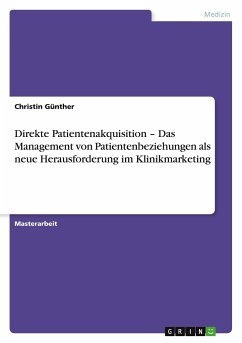Bachelor Thesis from the year 2009 in the subject Health - Miscellaneous, grade: 1,9, European Business School - International University Schloß Reichartshausen Oestrich-Winkel (Department for Market-Oriented Management), course: Health Care Management, language: English, abstract: In recent years, the German health care sector underwent considerable structural changes. Nevertheless, medical facilities increasingly recognise that their resources are limited and that they are subject to mechanisms of other markets, meaning that they need to ensure the own position in the health care market more than ever (Schreyögg, 2000, p. 185). Increased competition between hospitals, scarce resources, and amendments of legislation are forcing every provider of medical services to consider a sustained and efficient structure of the provision of their services over and above a strong customer orientation. With several reforms coming from the government, which were supposed to retain an eminent level of public health care and at the same time putting a halt on the consistently rising health care costs, the hospital was now heavily reliant on the number of patients treated. Thus, hospitals were faced with the challenge of retaining or gaining more patients, while concurrently having an unchanged or lower budget, which meant that the role of the hospital changed from being a mere renderer of medical services to having the function of an economic actor. Concretely, this implied for hospitals adopting a strategic concept that is aligned to the market and to the heterogeneous target groups of this market. Moreover, patients are nowadays not only driven in their demand by the quality of the medical treatment, but by a function of several different factors, which include among others the communication of a positive image through advertising and public relations. Nevertheless, business-like reasoning of the economist on the one hand and traditional Aesculapius professional perception of the physician on the other hand seem to be incompatible with each other, especially when having to make cost-benefit considerations for a treatment or in terms of hospital advertising. Frequently, ethical concerns stand in the way. However, it is inevitable that with the transition from a state-controlled to an autonomous health-care sector in a free-market economy, these concerns are put aside in the long-term, the more so as rising privatisations require economic thinking in hospital management. In every corporate process, communication management is a decisive factor and it should be embraced whenever implementing new strategies or informing the internal or external public (Ströh & Jaatinen, 2001, pp. 143-168).
Hinweis: Dieser Artikel kann nur an eine deutsche Lieferadresse ausgeliefert werden.
Hinweis: Dieser Artikel kann nur an eine deutsche Lieferadresse ausgeliefert werden.








